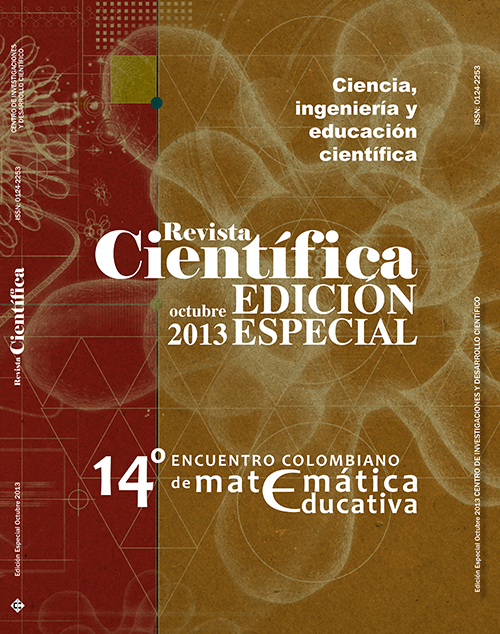DOI:
https://doi.org/10.14483/23448350.6546Publicado:
10/01/2013Número:
Vol. 17 Núm. 2 (2013): Junio-Diciembre 2013Sección:
ArtículosFormas de pensamiento algebraico temprano en alumnos de cuarto y quinto grados de educación básica primaria (9-10 años)
Palabras clave:
Matemáticas escolares, álgebra, relaciones, pensamiento algebraico, medios semióticos de objetivación, gesto, análisis microgenético, multimodalidad, aprendizaje, procesos cognitivos, generalización. (es).Descargas
Resumen (es)
Este reporte es parte de una investigación doctoral que se propone analizar formas de pensamiento algebraico en estudiantes de 9-10 años. Desde un enfoque microgenético (Vygotski, 1978) y una perspectiva multimodal de la cognición humana (Radford, Edwards & Arzarello, 2009) que considera la dimensión multi-semiótica, se analiza la actividad matemática de un estudiante de 10 años cuando se enfrenta a una tarea sobre generalización de patrones. El análisis preliminar sugiere que existen algunas conexiones entre la sintaxis de las “expresiones algebraicas” del estudiante y los medios semióticos de objetivación movilizados. Además, a través de uno de sus pronunciamientos, puede evidenciarse cómo el ritmo, el cual emerge como medio semiótico de objetivación, se incrusta en la sintaxis algebraica.
Referencias
Arzarello, F. (2006). Semiosis as a multimodal process.
Revista Latinoamericana de Investigación en Matemática Educativa, Special Issue on Semiotics, Culture, and
Mathematical Thinking, 267-299.
D´Amore, B. (2006). Objetos, significados, representaciones
semióticas y sentido. Relime. Número especial, 177-196.
Davydov, V. V. (1978). Tipos de generalización en la enseñanza. La Habana: Pueblo y Educación.
Frege, G. (1985). Sentido y referencia (U. Moulines, Trad.). En: Estudios sobre semántica (pp. 51-86). Madrid: Orbis (Original publicado en 1892).
Radford, L. (2006). Algebraic Thinking and the Generalization of Patterns: A Semiotic Perspective. In S. Alatorre, J. L. Cortina, M. Sáiz, A. Méndez (Eds.), Proceedings of the 28th Conference of the International Group for the Psychology of Mathematics Education, North American Chapter, Mérida: Universidad Pedagógica Nacional, November 9 – 12, Vol. 1, pp. 2-21.
Radford, L. (2008). Iconicity and contraction: A semiotic investigation of forms of algebraic generalizations of patterns in different contexts. ZDM Mathematics Education, 40 (1):
-96.
Radford, L. (2009). ¿Why do gestures matter? Sensuous cognition and the palpability of mathematical meanings. Educational Studies in Mathematics, 70(3), 111 – 126.
Radford, L. (2010). Layers of generality and types of generalization in pattern activities. PNA, 4(2), 37-62.
Radford, L. (2012). Early algebraic thinking: Epistemological, semiotic, and developmental issues. ICME-12 Regular Lecture. Seoul, South Korea.
Radford, L. (2013). Three key Concepts of the theory of objectification: Knowledge, knowing, and learning. Journal of Research in Mathematics Education, 2 (1), 7-44.
Radford, L., Bardini, C. & Sabena, C. (2006). Perceptual semiosis and the microgenesis of algebraic generalizations. Fourth Congress of the European Society for Research in
Mathematics Education (CERME 4), 17 – 21 February 2005, Sant Feliu de Guíxols, Spain, pp. 684-695.
Radford, L., Demers, S., Guzmán, J. & Cerulli, M. (2003), Calculators, Graphs and the Production of Meaning, en N. Pateman, B. Dougherty & J. Zilliox (eds.), Proceedings
of the 27 Conference of the International Group for the Psychology of Mathematics Education (pme27–pmena25), University of Hawaii, 4, pp. 55-62.
Radford, L. & Demers, S. (2004). Communication et apprentissage. Repères conceptuels et pratiques pour la salle de classe de mathématiques. Ottawa: Centre franco-ontarien des ressources pédagogiques.
Radford, L., Edwards, L. & Arzarello, F. (2009). Introduction: beyond words. Educational Studies in Mathematics, 70: 91-95.
Vygotski, L. S. (1978). Mind in Society: The Development of Higher Psychological Processes. Comp. Cole, M., John-Steiner, V., Scribner, S. y Souberman, E. Cambridge,
Mass.: Harvard University Press.
Vygotski, L. S. (2000). Obras escogidas (Vol. III) (L. Kuper, Trad.). Madrid: Visor. (Original publicado en 1931).
Wertsch, J. (1988). Vygotsky y la formación social de la mente. (J. Zanón y M. Cortés, Traductores). Barcelona: Paidós.
Cómo citar
APA
ACM
ACS
ABNT
Chicago
Harvard
IEEE
MLA
Turabian
Vancouver
Descargar cita
Licencia
El (los) autor(es) al enviar su artículo a la Revista Científica certifica que su manuscrito no ha sido, ni será presentado ni publicado en ninguna otra revista científica.
Dentro de las políticas editoriales establecidas para la Revista Científica en ninguna etapa del proceso editorial se establecen costos, el envío de artículos, la edición, publicación y posterior descarga de los contenidos es de manera gratuita dado que la revista es una publicación académica sin ánimo de lucro.



